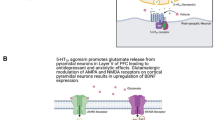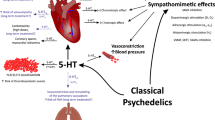Abstract
Background
The efficacy of antidepressants in irritable bowel syndrome (IBS) is controversial. No trials have directly compared a tricyclic with a selective serotonin reuptake inhibitor. Our aim was to determine whether imipramine and citalopram are efficacious in IBS.
Methods
This was a randomized, double-blind, placebo-controlled, parallel group pilot trial with imipramine (50 mg) and citalopram (40 mg).
Results
Of 51 IBS patients randomized, baseline characteristics were comparable among the treatment arms; the majority was diarrhea-predominant. Adequate relief of IBS symptoms (primary endpoint) was similar for each treatment arm. Improvements in bowel symptom severity rating for interference (P = 0.05) and distress (P = 0.02) were greater with imipramine versus placebo, but improvements in abdominal pain were not. There was a greater improvement in depression score (P = 0.08) and in the SF-36 Mental Component Score (P = 0.07), with imipramine. Citalopram was not superior to placebo. Approximately 20% of the variance in scores was explained by treatment differences for abdominal pain, bowel symptom severity disability, depression and the mental component of the SF-36.
Conclusion
Neither imipramine nor citalopram significantly improved global IBS endpoints over placebo.

Similar content being viewed by others
References
Drossman DA, Whitehead WE, Camilleri M (1997) Irritable bowel syndrome: a technical review for practice guideline development. Gastroenterology 112:2120–2137
Talley N, Spiller RC (2002) Irritable bowel syndrome: a little understood organic bowel disease? Lancet 360:555–564
Thompson W, Longstreth G, Drossman D, Heaton K, Irvine E, Muller-Lissner S (1999) Functional bowel disorders and functional abdominal pain. Gut 45:43–47
Longstreth GF, Thompson WG, Chey WD, Houghton LA, Mearin F, Spiller RC (2006) Functional bowel disorders. Gastroenterology 130:1480–1491
Cremonini F, Talley NJ (2005) Irritable bowel syndrome: epidemiology, natural history, health-care seeking and emerging risk factors. Gastroenterol Clin North Am 34:189–204
Whitehead WE, Burnett CK, Cook EW, Taub E (1996) Impact of irritable bowel syndrome on quality of life. Dig Dis Sci 41:2248–2253
Talley N, Gabriel S, Harmsen W, Zinsmeister A, Evans R (1995) Medical costs in community subjects with irritable bowel syndrome. Gastroenterology 109:1736–1741
Quartero A, Meineche-Schmidt V, Muris JW, Rubin G, de Wit N (2005) Bulking agents, antispasmodic and antidepressant medication for the treatment of irritable bowel syndrome. Cochrane Database Syst Rev CD003460
Talley NJ (2003) Evaluation of drug treatment in irritable bowel syndrome. Br J Clin Pharmacol 56:362–369
Koloski N, Talley N, Boyce P (2001) Predictors of health care seeking for irritable bowel syndrome and nonulcer dyspepsia: a critical review of the literature on symptom and psychosocial factors. Am J Gastroenterol 96:1340–1349
Lackner JM, Mesmer C, Morley S, Dowzer C, Hamilton S (2004) Psychological treatments for irritable bowel syndrome: a systematic review and meta-analysis. J Consult Clin Psychol 72:1100–1113
Clouse RE (1994) Antidepressants for functional gastrointestinal syndromes. Dig Dis Sci 39:2352–2363
Clouse RE, Lustman PJ, Geisman RA, Alpers DH (1994) Antidepressant therapy in 138 patients with irritable bowel syndrome: a five-year clinical experience. Aliment Pharmacol Ther 8:409–416
Gorard DA, Libby GW, Farthing MJG (1994) Influence of antidepressants on whole gut orocaecal transit times in health and irritable bowel syndrome. Aliment Pharmacol Ther 8:159–166
Camilleri M, Mayer EA, Drossman DA, Heath A, Dukes GE, McSorley D, Kong S, Mangel AW, Northcutt AR (1999) Improvement in pain and bowel function in female irritable bowel patients with alosetron, a 5-HT3 receptor antagonist. Aliment Pharmacol Ther 13:1149–1159
Guy W (1976) ECDEU assessment manual for psychopharmacology publication ADM 76–338. U.S. Department of Health Education, Welfare, Washington D.C., pp 217–22
Boyce P, Gilchrist J, Talley NJ, Rose D (2000) Cognitive-behaviour therapy as a treatment for irritable bowel syndrome: a pilot study. Aust NZ J Psych 34:300–309
Drossman DA, Li Z, Toner BB, Diamant NE, Creed FH, Thompson D, Read NW, Babbs C, Barreiro M, Bank L et al (1995) Functional bowel disorders. A multicenter comparison of health status and development of illness severity index. Dig Dis Sci 40:986–995
Crawford JR, Henry JD, Crombie C, Taylor EP (2001) Normative data for the HADS from a large non-clinical sample. Br J Clin Psychol 40:429–434
Grayson D (1989) Latent trait analysis of Eysenck Personality Questionnaire. J Psychol Res 20:217–235
Ware JEJ, Gandek B (1998) Overview of the SF-36 health survey and the International Quality of Life Assessment (IQOLA) project. J Clin Epidemiol 51:903–912
Irvine EJ, Whitehead WE, Chey WD, Matsueda K, Shaw M, Talley NJ, Veldhuyzen van Zanten SJO (2006) Design of treatment trials for functional gastrointestinal disorders. Gastroenterology 130:1538–1551
Drossman D, Toner BB, Whitehead WE, Diamant NE, Dalton CB, Duncan S, Emmott S, Proffitt V, Akman D, Frusciante K, Le T, Meyer K, Bradshaw B, Mikula K, Morris CB, Blackman CJ, Hu Y, Jia H, Li JZ, Koch GG, Bangdiwala SI (2003) Cognitive-behavioral therapy versus education and desipramine versus placebo for moderate to severe functional bowel disorders. Gastroenterology 125:19–31
Kuiken SD, Tytgat GN, Boeckxstaens GE (2003) The selective serotonin reuptake inhibitor fluoxetine does not change rectal sensitivity and symptoms in patients with irritable bowel syndrome: a double blind, randomized, placebo-controlled study. Clin Gastoenterol Hepatol 1:219–228
Tack J, Broekaert D, Fischler B, Oudenhove LV, Gevers AM, Janssens J (2006) A controlled crossover study of the selective serotonin reuptake inhibitor citalopram in irritable bowel syndrome. Gut 55:1095–1103
Vahedi H, Merat S, Rashidioon A, Choddoosi A, Malekzadeh R (2005) The effect of fluoxetine in patients with pain and constipation-predominant irritable bowel syndrome: a double-blind randomized-controlled study. Aliment Pharmacol Therap 22:381–385
Acknowledgements
This work was supported by the National Health and Medical Research Council of Australia (Dr. Talley, PI). Citalopram was provided free of charge for the study by Lundbeck Australia Pty Ltd. Imipramine was provided free of charge for this study by Novartis Pharmaceuticals Australia Pty Ltd.
Author information
Authors and Affiliations
Corresponding author
Rights and permissions
About this article
Cite this article
Talley, N.J., Kellow, J.E., Boyce, P. et al. Antidepressant Therapy (Imipramine and Citalopram) for Irritable Bowel Syndrome: A Double-Blind, Randomized, Placebo-Controlled Trial. Dig Dis Sci 53, 108–115 (2008). https://doi.org/10.1007/s10620-007-9830-4
Received:
Accepted:
Published:
Issue Date:
DOI: https://doi.org/10.1007/s10620-007-9830-4




